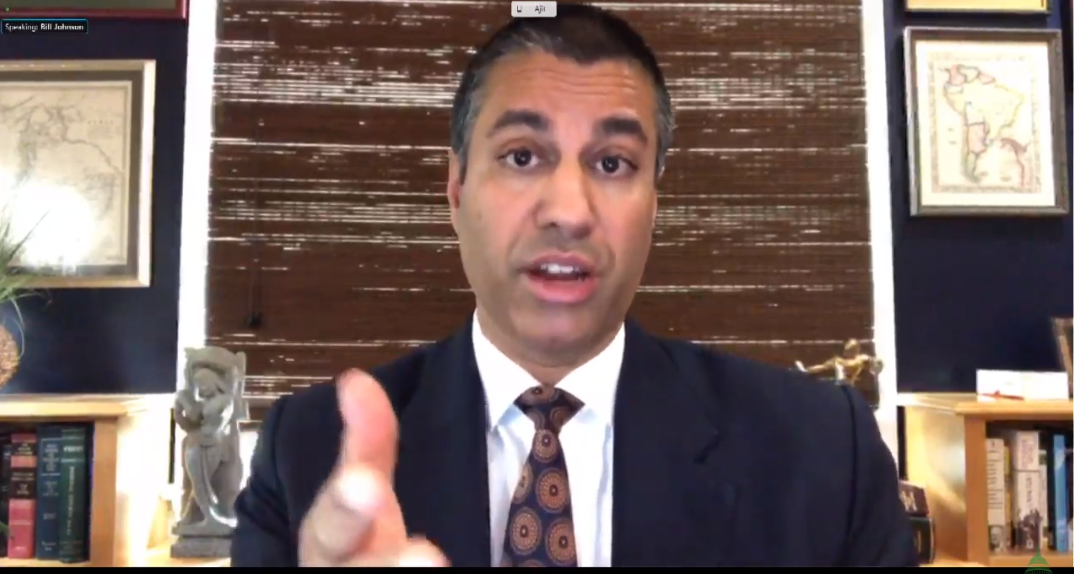Pai: FCC Will Clarify Section 230
Said they have no First Amendment right to immunity denied others, including broadcasters

The smarter way to stay on top of the multichannel video marketplace. Sign up below.
You are now subscribed
Your newsletter sign-up was successful
FCC chairman Ajit Pai has signaled he plans to follow President Trump's lead and "clarify" Section 230 of the Communications Decency Act. He also says he has been assured by FCC lawyers that the FCC has the authority to do so.
“As elected officials consider whether to change the law, the question remains: What does Section 230 currently mean?," Pai said in a statement. "[M]any advance an overly broad interpretation that in some cases shields social media companies from consumer protection laws in a way that has no basis in the text of Section 230. The Commission’s General Counsel has informed me that the FCC has the legal authority to interpret Section 230. Consistent with this advice, I intend to move forward with a rulemaking to clarify its meaning."
Related: Trump Tackles the Edge
As part of an Executive Order on social media, the Trump Administration asked for that clarification in a petition to the FCC. that order and petition followed the President's criticism of Twitter for flagging his tweets on mail-in voting and protests, as well as his long-standing allegations that there is systematic bias against conservative voices in Silicon Valley.
Democrats, including Democratic FCC commissioners have argued the FCC should not act on the petition to regulate social media, in part because it lacks the authority.
But in a statement Thursday announcing his plans to address the issue, Pai clearly disagreed--Sec. 230 provides social media and other Web sites with immunity from civil liability for their moderation of third party content.
“Throughout my tenure at the Federal Communications Commission, I have favored regulatory parity, transparency, and free expression," Pai said. "Social media companies have a First Amendment right to free speech. But they do not have a First Amendment right to a special immunity denied to other media outlets, such as newspapers and broadcasters.”
The smarter way to stay on top of the multichannel video marketplace. Sign up below.
Related: Trump Says Big Tech Is Waging War on Free Expression
The issue of what, if anything, to do about Sec.230 has been much in the news, including commentary from Supreme Court Justice Clarence Thomas and Republican senators seeking to subpoena Twitter CEO Jack Dorsey over Twitters blocking of a story in the New York Post about Hunter Biden.
There have also been bipartisan calls to revisit the section given the power and scale of social media giants.
"The timing of this effort is absurd," said Democratic commissioner Jessica Rosenworcel. "The FCC has no business being the President’s speech police.”
House Republican leaders were all for clarification.
“Time and time again we’ve seen big tech companies refuse to be transparent about their practices and too often unfairly censor right of center voices," said Rep. Greg Walden (R-Ore.), ranking member of the House Energy & Commerce Committee; Rep. Bob Latta (R-Ohio); and Cathy McMorris Rodgers (R-Wash.), ranking member of the Consumer Protection Subcommittee. "This must stop. Twitter, Facebook, and others should take a long, hard look at the policies that determine what they suppress on their platforms. Why is the New York Post story problematic, but stories from other outlets containing leaked, hacked, or classified information okay? At what point do these platforms take on the responsibility of publishers, and should they be treated as such? Should Section 230 protections apply to platforms who act as publishers? We’re encouraged to see these questions being raised and look forward to working with key stakeholders, including the FCC, to clarify the intent of a law enacted nearly 25 years ago."
“It looks like FCC chairman Ajit Pai agrees with the comments that the Free State Foundation submitted to the Commission contending that the agency possesses the authority to clarify the meaning of some of Section 230’s terms and that it may be able to do so consistent with the First Amendment," said Free State Foundation president Randolph May. "In our comments, we emphasized that there is a difference between the FCC providing its interpretation as to the meaning of Section 230’s provisions, for whatever weight the courts then may decide to give to the agency’s interpretation, and the FCC taking enforcement actions pursuant to Section 230. And we emphasized that any action that has the effect of narrowing Section 230’s broad grant of immunity doesn’t necessarily violate the First Amendment. There is an important distinction, for purposes of the First Amendment application, between protecting a content provider’s, say Twitter’s, right to decide what to carry or delete, and granting such content provider immunity from suits for all of its content moderation decisions. I’m pleased, but not surprised, that [chairman] Pai appreciates these points regarding the First Amendment and the Commission’s legal authority."
Contributing editor John Eggerton has been an editor and/or writer on media regulation, legislation and policy for over four decades, including covering the FCC, FTC, Congress, the major media trade associations, and the federal courts. In addition to Multichannel News and Broadcasting + Cable, his work has appeared in Radio World, TV Technology, TV Fax, This Week in Consumer Electronics, Variety and the Encyclopedia Britannica.

